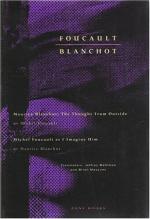|
This section contains 1,949 words (approx. 7 pages at 300 words per page) |

|
SOURCE: “Pure Writing for Now People,” in Voice Literary Supplement, No. 7, May, 1982, p. 8.
In the following essay, Kendrick discusses some of Blanchot's major themes and theoretical preoccupations in his fiction, the English translations of his writings, his association with other writers, and his critical reception in the United States.
“A story? No. No stories, never again,” says the narrator of The Madness of the Day. Actually, he says it in French: “Un récit? Non, pas de récit, plus jamais.” This edition is bilingual, so you can compare the English with the French, a bold stroke for a translation. In a footnote to his note, “Thomas and the Possibility of Translation,” appended to Thomas the Obscure (Thomas l’Obscur), Robert Lamberton remarks that Blanchot wrote to Lydia Davis, in regard to her translation of L’Arrêt de Mort, that Death Sentence was really her (Davis’s...
|
This section contains 1,949 words (approx. 7 pages at 300 words per page) |

|


